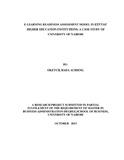| dc.description.abstract | In order to benefit from eLearning, institutions of higher learning should conduct
considerable up-front analysis to assess their eLearning readiness. Studies show that there
are numerous models that have been developed, however, they are used in developed
counties whose e-readiness is high hence not applicable in developing countries.
This paper includes a model that has been developed to assess eLearning readiness of
lecturers from institutions of higher learning in Kenya. It investigates the eLearning
readiness of lecturers from the University of Nairobi, and the objective was to carry out a
diagnostic eLearning readiness assessment of lecturers and determine the factors that
influence eLearning readiness. The questionnaires were administered to the lecturers,
the results obtained indicate that an overwhelming majority are ready for eLearning with
a mean score of 3.95 higher than the expected level of readiness [Mr = 3.95 > Melr = 3.4],
they have ICT skills required and there is a strong management support for the use of
eLearning in teaching. In addition, the study results show that there is no significant
relationship between age, gender, and level of education on eLearning readiness.
However, the study results indicate that technological readiness is the most important
factor followed by culture readiness in eLearning readiness. Most of the lecturers felt that
more training on content development need to be conducted, these findings concur with
Muganda (2006) findings on eLearning implementation at the University.
In conclusion, the lecturers are ready for eLearning but the ICT infrastructure is not
adequate enough to support the use of eLearning. The University management should
therefore put more emphasis on improving its infrastructure and conduct more training on
eLearning content development for its staff. | en |

